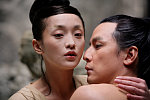 Shadows off the beaten path
Shadows off the beaten pathPRICELESS | SUMMER HOURS
< < F O R E I G N > >
last update 11.Jun.08
See also: SHADOWS FILM FESTIVAL
 R E V I E W B Y R I C H C L I N E
R E V I E W B Y R I C H C L I N E
scr Sheng Heyu, Qiu Gangjian
with Ziyi Zhang, Ge You, Daniel Wu, Zhou Xun, Ma Jingwu, Huang Xiaoming, Zhou Zhonghe, Zeng Qiusheng, Xu Xiyan, Liu Yanbin, Ma Lun, Liu Tieyong
 release Chn 30.Aug.06,
release Chn 30.Aug.06, US 26.Feb.08 dvd,
UK 11.Apr.08
06/China 2h11
TIGER FILM FEST
 It's great to see a Chinese wuxia costume epic as a dark dramatic tragedy rather than a colourful action romp. On the other hand, this variation on Hamlet is a bit slow and dour.
It's great to see a Chinese wuxia costume epic as a dark dramatic tragedy rather than a colourful action romp. On the other hand, this variation on Hamlet is a bit slow and dour.
In 907 BC, the Chinese emperor dies from a scorpion bite, and his brother (Ge) assumes the throne, as well as the young empress (Zhang), sending his minions to kill Prince Wu Luan (Wu), who's been sent to an isolated arts commune. But the prince escapes and, convinced his uncle killed his father, he returns for revenge, aided by Qing (Zhou), daughter of a top minister (Ma). All of the jealousy and betrayal comes to boil at a banquet the emperor holds in honour of his first, and probably last, 100 days in power.
Director Feng gives the story a massive scale, combining the tortured melodrama with sumptuous sets and costumes, superbly choreographed action and massive crowd sequences. Where he diverges from the usual style is in his stately, unhurried pacing. The fight scenes are shot in balletic slow motion, capturing the visual beauty as well as the bloody violence, but completely lacking in either suspense or desperation. This leaves the film feeling like a stylised stage play rather than a wrenching tragedy.
Even so, Zhang delivers a fascinating performance, providing tension and angst with her still face and expressive eyes. She's terrific as a woman who's bound to every other character in seriously twisted ways--from an innuendo-filled relationship with her impetuous stepson to vixen-like behaviour with her easily distracted brother-in-law. The problem is that she's not remotely sympathetic, and everyone else seems dull and uninteresting by comparison.
Without a character we care about or action to get our pulses racing, this ends up as merely a handsomely filmed echo of Shakespeare's timeless themes. There's a clever mask motif running all the way through, as everyone is hiding their true desires, but the plot gets bogged down in the political machinations. That said, the climactic banquet sequence is grippingly played out, as each person's careful plan comes tragically undone. It's beautiful to watch, but it's a shame that it doesn't move us.
6.Jun.08
 R E V I E W B Y R I C H C L I N E
R E V I E W B Y R I C H C L I N E The Kickboxer
The Kickboxer
scr Xavier Durringer, Christophe Mordellet, Dida, Véra Belmont, François Greze
with Dida, Bernard Giraudeau, Florence Vanida Faivre, Lakshan, Sombati Meddhanee, Rit Luecha, Jean-Pierre Léonardini, Fariza Mimoun, Calbo, Charoenthong Kiatbanchong, Kimyu Rukyindee, Pisek Intrakanchit

release Fr 16.Feb.05,
US 27.Jun.06 dvd,
UK 9.Jun.08 dvd
05/France 1h45
TIGER FILM FEST
 With a steely, realistic style, this Thai boxing drama is a pleasant surprise, avoiding movie clichés to tell a fictionalised version of its lead actor's life. The structure is a bit rambling and distracted, but it's still solidly involving.
With a steely, realistic style, this Thai boxing drama is a pleasant surprise, avoiding movie clichés to tell a fictionalised version of its lead actor's life. The structure is a bit rambling and distracted, but it's still solidly involving.
In a French prison, tough guy Ryan (Dida) meets the older Jean (Giraudeau), who trains him in the ways of Muay Thai. On release, Ryan flies to Bangkok to learn more, but the training school refuses to accept foreigners. So he camps on the doorstep, taking menial tasks until he gets a chance to prove himself. Meanwhile, he meets Jean's estranged daughter (Faivre). And when Jean returns to Bangkok, old scores with his former business partner (Meddhanee) must be settled just as Ryan begins to succeed in the boxing ring.
The Algerian-born Dida is a remarkable screen presence, (think Jason Statham crossed with Jean-Claude Van Damme). As he retraces his own steps to the Muay Thai world championship (which Dida won at 21, nearly 14 years before making this film), his acting is a bit overserious, but this actually adds to the intensity. He's tenacious but not overly macho, with a whiff of sensitivity about him. His scenes with Faivre are understated and sexy.
Meanwhile, director-cowriter Durringer adds a muscular, gritty edge, plus the colour of the Thai setting. The boxing feels strikingly realistic, often shot in an almost balletic slo-mo but never avoiding the raw brutality. All of this is so well done that it's a shame when the pacing stumbles as the film gets bogged down in Jean's melodrama of betrayal, grief, regret and revenge, plus a sideroad into the world of back-alley fighting, which is seriously gruesome and vicious.
In the end, the final big fight scene isn't strictly necessary (or very compellingly played out). It's as if the filmmakers couldn't quite figure out how to end the movie in a convincing or decisive way, so they resort to a combination of triumph and tragedy that's moving and interesting, but not wholly satisfying. Even so, the characters are so engaging and the film is so well-made that we stick with it.
2.Jun.08
 R E V I E W B Y R I C H C L I N E
R E V I E W B Y R I C H C L I N E Hors de Prix
Hors de Prix
scr Benoit Graffin, Pierre Salvadori
with Audrey Tautou, Gad Elmaleh, Marie-Christine Adam, Vernon Dobtcheff, Jacques Spiesser, Annelise Hesme, Didier Brice, Charlotte Vermeil, Claudine Baschet, Laurent Claret, Jean de Coninck, Blandine Pélissier
 release Fr 13.Dec.06,
release Fr 13.Dec.06, US 28.Mar.08,
UK 13.Jun.08
06/France 1h44
 Fluffy and silly, but ultimately thoroughly charming, this French rom-com makes the most of its engaging cast and superb locations, harking back to a more classical style of wry comedic filmmaking.
Fluffy and silly, but ultimately thoroughly charming, this French rom-com makes the most of its engaging cast and superb locations, harking back to a more classical style of wry comedic filmmaking.
In a posh Biarritz hotel, gold-digging Irene (Tatou) mistakes barman Jean (Elmaleh) for a millionaire and turns on the charm. He can't believe his luck, but when she finds out the truth she runs off to Nice to find a real sugar daddy. Jean eventually tracks her down and, unable to compete with her wealthy suitors, he takes on a benefactor (Adam) himself. Soon Jean and Irene are competing to see who can get the biggest presents from their patrons, all while they're falling for each other, of course.
The genius of this film is that both Jean and Irene start out as fairly unlikeable, pathetic characters, but as the story progresses, they begin to charm us just as they are inadvertently charming each other. Tatou and Elmaleh are both impish and mischievous, lighting up the screen with their expressive eyes and attitude-filled dialog. They even have fun with the film's full-on farcical slapstick, as do the rest of the actors. They all just go for it, never winking at the camera as if to admit that this is all utterly ridiculous.
This is quite a surprising approach in today's over-referential cinematic landscape, where filmmakers cynically acknowledge the formula while milking it for everything they can get. On the other hand, Salvadori and Graffin wear their hearts on their sleeves, and the tactic works: it's refreshing to see a film that exists for pure entertainment reasons, unafraid to pour on the sweetness and romance, and even get a bit naughty along the way.
There's not much to this film at all beyond a goofy comedy about mistaken identity and an escalating game of call my bluff, all in the service of a thoroughly endearing love story. And even as it gets increasingly ludicrous, we can't help but fall in love with these two hapless losers. And it helps, of course, that it all takes place in the sunny glamour of the French Riviera.
8.Apr.08
 R E V I E W B Y R I C H C L I N E
R E V I E W B Y R I C H C L I N E L’Heure d’Été
L’Heure d’Été
with Juliette Binoche, Charles Berling, Jérémie Renier, Edith Scob, Dominique Reymond, Valérie Bonneton, Isabelle Sadoyan, Kyle Eastwood, Alice de Lencquesaing, Emile Berling, Jean-Baptiste Malartre, Michel Waldemar
 release France 5.Mar.08,
release France 5.Mar.08, UK 18.Jul.08,
US 15.May.09
08/France MK2 1h42

• BEST SUPPORTING ACTOR:
Jérémie Renier

 French filmmaker Assayas examines the changing face of the family in a fragmented world. With vivid characters and a story anyone can identify with, the film is packed with telling and moving observations.
French filmmaker Assayas examines the changing face of the family in a fragmented world. With vivid characters and a story anyone can identify with, the film is packed with telling and moving observations.
Helene (Scob) has lived is the heir to her artist brother's amazing collection, which she keeps in the family's country home. When she dies, her three 40-ish children have difficult decisions to make: Adrienne (Binoche) is a successful New York designer, Jeremie (Renier) is a rising-star businessman in China, and Paris university professor Frederic (Berling) is the only one who wants to keep the house and collection in tact. All of them must come to terms with shared childhood memories, family treasures and the fact that life goes on.
This may sound rather mopey, but Assayas takes a lyrical approach, letting the camera slide easily amongst the characters to witness their interaction. The film essentially has three sections: we first meet everyone at Helene's 75th birthday party, then there's the aftermath of her death and finally the last summer in the beloved house. Along the way, the generational gaps become increasingly apparent, as do the differing opinions among the siblings.
The cast is superb, with Binoche, Berling and Renier finding intriguing depth in their characters without being obvious about it. As a result, the entire film feels light and airy, never wallowing in the intense emotions these people are working through. The conversations among the family members have a casual, free-form tone, as they drift within the space of a few minutes from differing opinions and warm nostalgia to deeply felt emotions and jagged humour. In other words, this is a recognisable family; they truly love each other even though they choose to live on different continents.
In addition to a clever comment on the nature and value of art, Assayas' main point is that family history is the bond that tightly holds these people together, even as that history continues to evolve from the past to the future. And his remarkable achievement is to capture balance of conflicts and commonalities within this context. There's nothing particularly provocative in the plot or situations, but the feelings and ideas linger long afterwards.
21.Apr.08


See also: SHADOWS FILM FESTIVAL
© 2008 by Rich Cline, Shadows
on the Wall